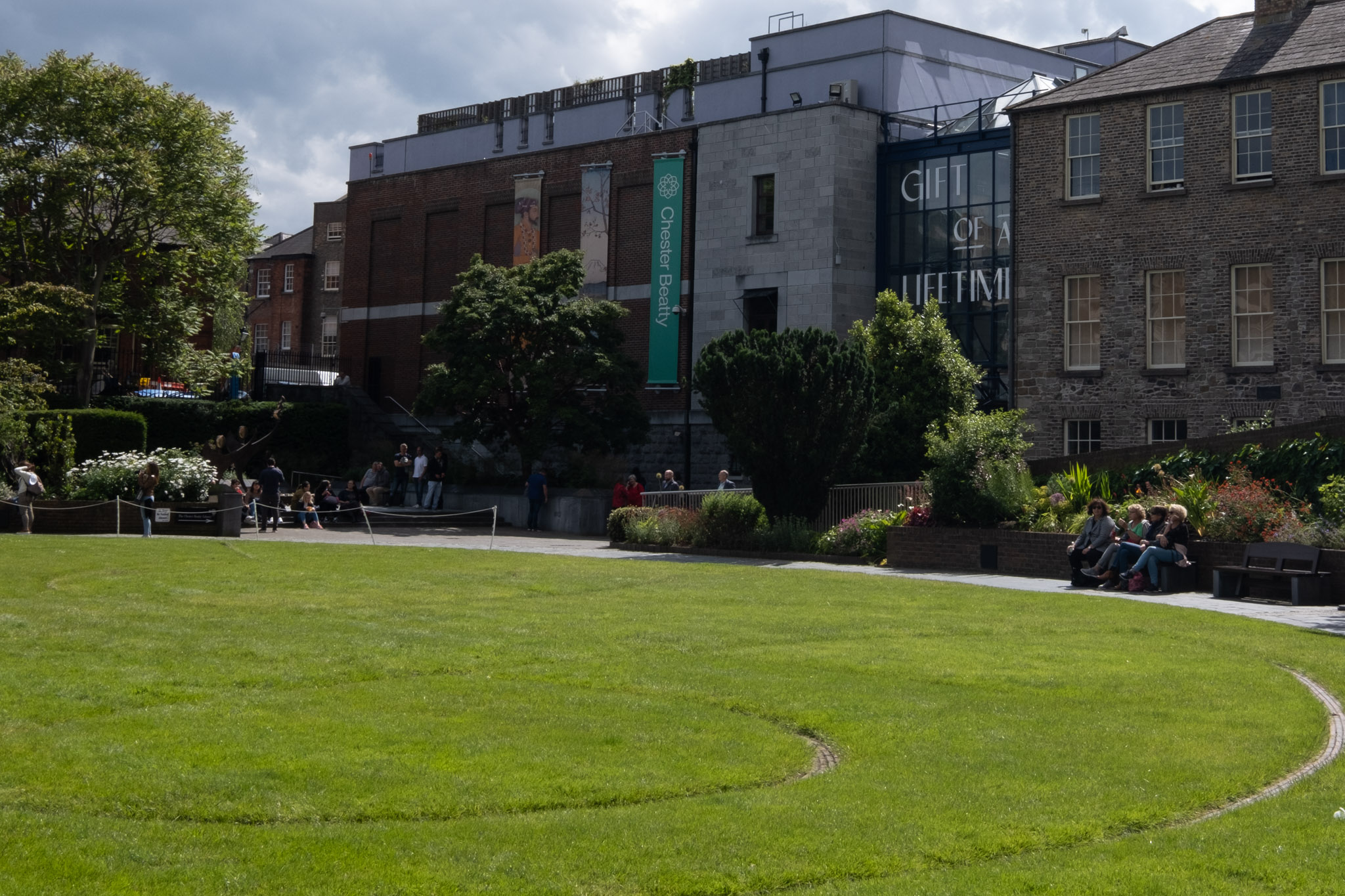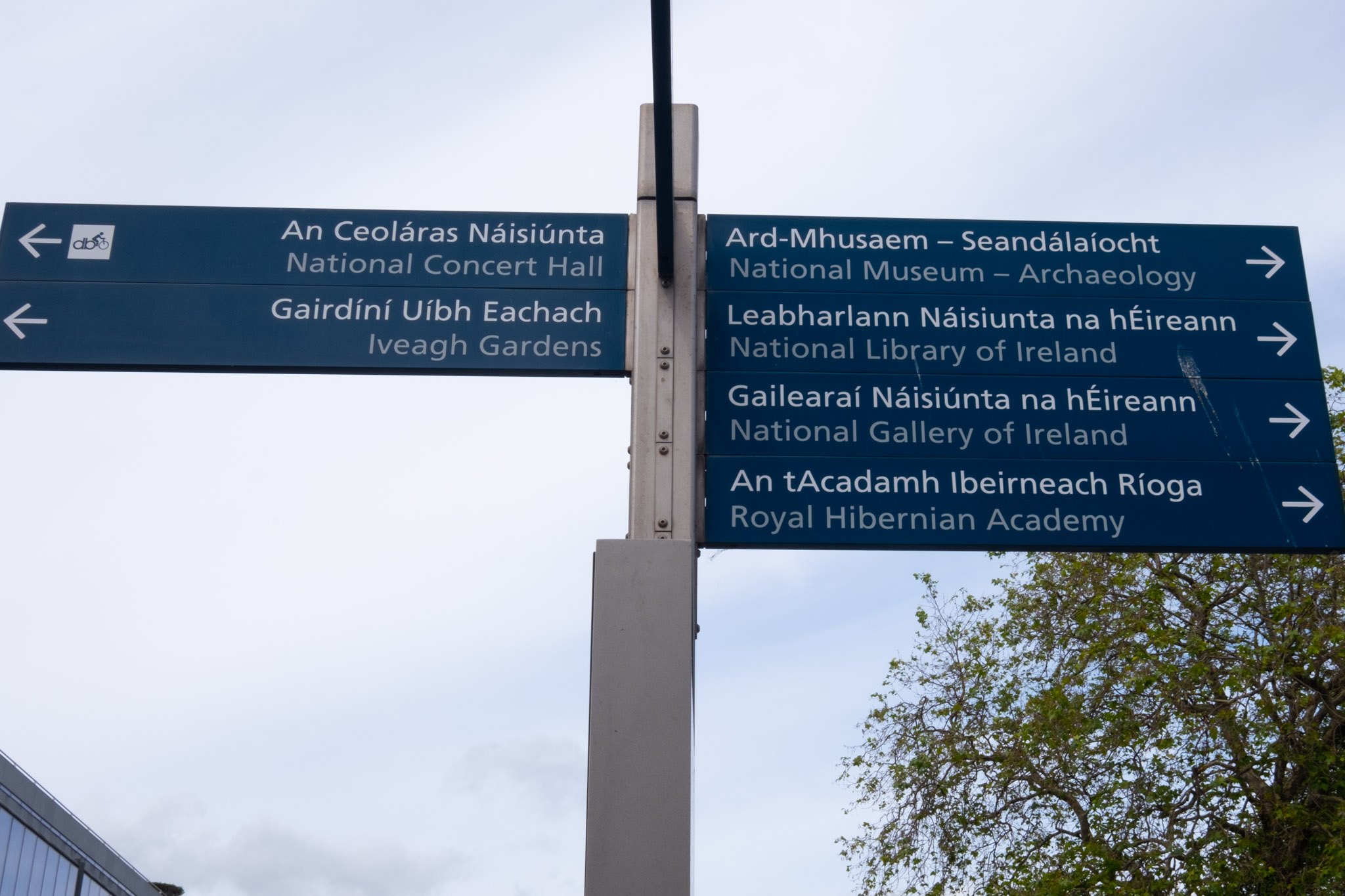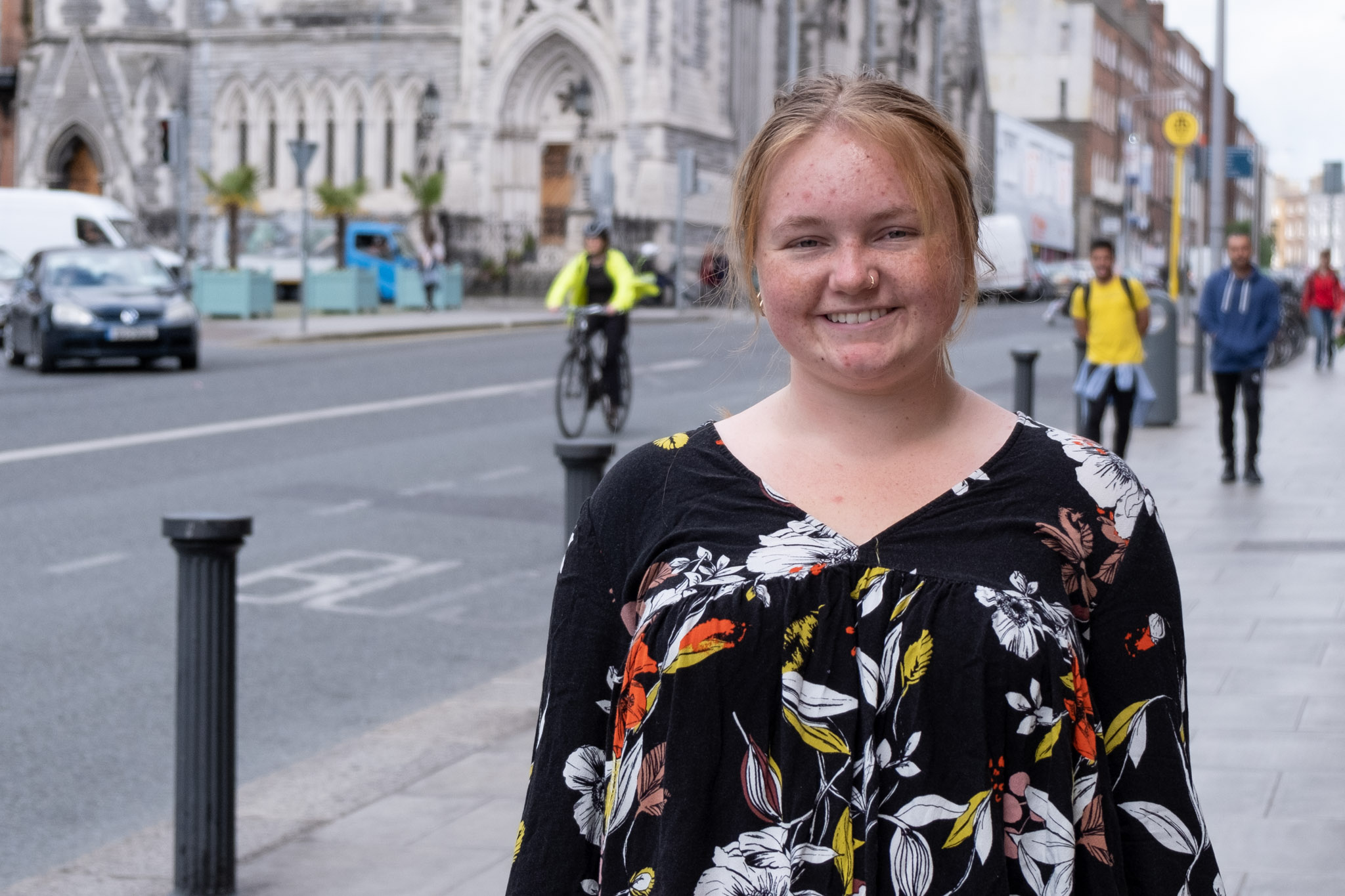Return to the search form Return to your search results
Irish Writing Program
Fast Facts
Sessions Offered:
Summer
Location:
Dublin, Ireland
Credit:
Resident
Eligibility:
• Clear interest and commitment
• Demonstrated preparedness/maturity
• Minimum 2.75 GPA
• Good academic and disciplinary standing
• Completion of at least one semester of college-level study at the time the program begins
• Faculty approval
• Participation in orientation programming
Application Due:
• February 17
Program Cost:
Check the 'Costs' section under the Application tab.

Writing Retreat
Spend six weeks under the direct mentorship and sustained guidance of an award-winning creative writing faculty member in Dublin, Ireland, immersing yourself in the city’s rich literary culture and gaining vital skills as a writer and a scholar. Using the city as a living laboratory, you will engage directly in a hands-on way with contemporary questions that help unlock your passions as a writer and thinker. Explore how you can connect your love of writing with your fascination for history, ecology, architecture, linguistics, anthropology, urban design, immigration, genealogy, art, music, film or food. Learn practical research techniques that will help you channel your discoveries creatively, in any genre. Study literature, history and playwrighting with a dedicated faculty of Dublin-based scholars. Experience what it means to explore these scholarly and creative questions in a supportive, intensive community. And come home inspired to connect what you have learned to your future path. Past participants have directly channeled what they gained from the Dublin program into developing future pots-graduation plans: from securing summer internships with media outlets, to applying for Fulbright Fellowships, to publishing in student literary magazines, to refining their Law School and MFA applications.
Learn more about the Irish Writing Program from past years through our deep dive videos:
Academic Program
Participants in the Irish Writing Program enroll in two required courses:
Dublin Writing Workshop
This course is taught by University of Iowa faculty. Credit for this course can typically be applied to the requirements for the University of Iowa’s English major and Certificate in Writing. Contact your academic advisor for details on how this program can be applied to your requirements.
See below for a syllabus for the summer 2025 session of the program. The syllabus for summer 2026 will be available by early spring.

Bridge in Dublin over the River Liffey
Literature and Culture of the 20th Century
This course is made up of three component, including drama, poetry, and fiction. Each component is taught by local Irish faculty. Credit for this course can typically be applied to the requirements for the University of Iowa’s English major and Certificate in Writing. Contact your academic advisor for details on how this program can be applied to your requirements.
See below for a syllabus for a previous session of the program. The syllabus for summer 2026 will be available by early spring.

Grafton Street
Course Description
An appreciation of Irish literature and culture is inextricably bound to a familiarity with Irish history. This interdisciplinary course will examine Irish literature, drama, visual arts, cinema, music, history, and culture. It will introduce students to a variety of Irish writers, ranging from the modernist authors, Joyce and Yeats, to contemporary poetry, prose, and drama.
Sample reading list (from a previous program- this will vary according to the tastes and interests of the instructors):
- John Banville. The Book of Evidence.
- Oona Frawley (ed.). New Dubliners.
- Ciaran Carson. Prose & poetry selections.
- Various writers. Poetry & conflict in Northern Ireland.
- James Joyce. Dubliners.
- William B. Yeats. Selected Poems.
- John M. Synge. The Playboy of the Western World.
- Martin McDonagh. The Beauty Queen of Leenane.
- Mark O'Rowe. Howie the Rookie.
- Frank McGuinness. Observe the Sons of Ulster Marching Towards the Somme.
- Tom Murphy. A Whistle in the Dark.
- Brian Friel. Translations.
Transcripts and Grading
Participants are awarded a University of Iowa transcript, and are graded using US letter grades.
Each course provides 3 semester hours (s.h.) or credit, for a total of 6 s.h. for the summer session.
Applying credit toward a UI degree
Unless UI Study Abroad has an approval on file for the courses you take abroad to be applied toward a specific major, minor, certificate, or general education requirement, you will receive general elective credit for your course.
If you plan to apply the credit you receive for your program course to a major, minor, certificate, or general education requirement, contact your UI study abroad advisor for details on the process.
Cultural Activities

Howth Coast
A welcome meal and farewell dinner will be provided as part of the course fee, and the program allows for a variety of opportunities to get acquainted with Dublin and its environs. Excursions are typically offered as part of the course work.
Program Dates
The Summer 2026 session will take place from June 9 - July 26. Students will depart from the US on June 9, and arrive in Dublin on June 10.

For More Information
For more details about this program please contact Faculty Director Inara Verzemnieks or Study Abroad Program Coordinator Cory Petersen.
Dublin
Dublin is a vibrant, European capital city of historical and cultural importance. From its many theaters to its beautiful parks to its friendly, cozy pubs, Dublin is an excellent place to be educated and entertained.

Dublin Street Scene
Ireland

Chester Beatty Library, Dublin
Ireland is an island in the North Atlantic Ocean. The country of Ireland (properly referred to as the Republic of Ireland) shares the island with Northern Ireland. The Republic of Ireland is an independent country that is a member of the European Union. Northern Ireland is the name of the other country on Ireland, and is a member of the United Kingdom along with Scotland, Wales, and England.
Ireland is a nation of about 4.5 million people. Ireland’s friendly population, gorgeous natural environment, unique culture, and rich history make it a fantastic place to study. Ireland’s contribution to literature written in English and indeed other languages is immense, and so the country is an ideal destination for students who want to make the exploration of literature and language the focus of their time abroad.

Street Sign in Dublin
US Department of State Country Information
The US Department of State provides safety and security information for every country of the world to help you assess for yourself the risks of travel. Each country information page contains a Travel Advisory, Alerts, and other important details specific to that country that could affect you.
Pay close attention to the entry and exit requirements, local laws and customs, health conditions, and other details to help decide whether traveling to any given country is right for you. Non-US citizen travelers may also wish to seek guidance from the embassy of their country of citizenship. The UI International Travel Policy for Students addresses restrictions on student travel to high-risk locations and engagement in high-risk activities abroad.

Living Arrangements
Accommodations are arranged by our partners in Dublin prior to departure. Housing costs are included in the course fee. Amenities vary by session, but typically include a fully furnished apartment with private bedrooms, a shared kitchen and living area, internet access, and access to paid laundry facilities. Students are expected to keep their apartments clean and in the order they were during move-in. Any damage will be assessed at the end of the program.
Accommodations are provided for the duration of the program only. It is not possible to get into the accommodations before the official start of the program.
Passport
All students need a valid passport to participate in this program. If you do not have a passport, it is important that you apply for one as soon as possible to ensure you receive it before the program begins. U.S. citizens can find more information about how to apply for a passport on the US Department of State’s website.
Important notice for students without a valid passport or whose passport will expire within the next 12 months:U.S. citizens can find more information about how to renew a passport on the US Department of State’s website.
Students with a valid passport should check the expiration date. Passports must be valid for at least 6 months AFTER the anticipated return to the U.S. from studying abroad. If your passport is not valid for at least 6 months after your anticipated date of return to the U.S., you must renew your passport before traveling to your host country.
Expedited processing service is available for US passports (although this still takes several weeks and is at an additional cost). U.I. Study Abroad encourages students to ask the passport agency at the time of application whether expedited service is recommended.
Non-U.S. Citizens
Students who are not U.S. citizens should contact their consulate for more information if they need to get a new passport or renew their passport.
Travel Arrangements (Flights)

Student accommodation kitchen
UI Study Abroad will designate a suggested group flight by early spring. Participants will make their own travel arrangements to Dublin with guidance from UI Study Abroad and are advised to take part in this suggested itinerary.
The cost of travel is not included in the course fee.
Arrival arrangements at the airport in Dublin and transportation to the program site will be based on the suggested flight. Alternative arrangements for transportation from the airport to the program site for students who do not participate in the suggested flight can be made with guidance from UI Study Abroad.
Do not purchase plane tickets until you have received instructions from UI Study Abroad. Plan to purchase your plane tickets by early April.
Local Transportation
Dublin has an excellent public transportation system comprised of buses and a light rail. A transportation pass for each student is included in the program fee. Dublin's modern, international airport provides a hub to all major European capital cities.

Eligibility
The Irish Writing Program is open to students attending U.S. institutions, and who fulfill the following requirements:
- Good academic and disciplinary standing: Students must be in good academic and disciplinary standing at the University of Iowa, or at another US college or university where the applicant is enrolled in a degree program. Students placed on either academic or disciplinary probation for any period of time overlapping with the study abroad program dates are ineligible to study abroad on a University of Iowa program. Academic and disciplinary history will also be considered when determining whether a student is prepared to represent the University of Iowa as part of this program. Students who are not in good standing at any point overlapping with the program dates will have their acceptance revoked, and will be responsible for the associated late withdrawal fees.
- Minimum 2.75 cumulative GPA: Students must have a minimum 2.75 cumulative GPA to participate in this program.
- Completion of at least one semester of college-level study: First-year student applicants should be prepared to provide at least two academic references when submitting their application materials.
- Approval by faculty director and UI Study Abroad: Applications will be reviewed by the program’s faculty director, and students will be accepted based on their eligibility, a review of a writing sample, a grade report, and a statement of purpose.
- Attendance at mandatory orientation programming: Students must attend all in-person and online pre-departure orientation programming.
- Clear interest and commitment: This program is open to students of all academic backgrounds. Students must demonstrate a clear academic or personal interest in the program’s subject matter and a commitment to engage responsibly in coursework abroad.
- Demonstrated preparedness and maturity- Students must demonstrate preparedness to take on the heightened responsibilities associated with international study and travel. Students must demonstrate a commitment to behave responsibly abroad while respecting cultural differences. Students are expected to obey both local laws and program directives conveyed to participants before and during the program. The University of Iowa Code of Student Life applies to all program participants while abroad.
In addition to the requirements above, preference is given to applicants who:
- Have completed at least two prior semesters of college-level study: Preference is given to students who have already completed at least two semesters of college-level study at the time they submit their application.
Participants who are enrolled at institutions other than the University of Iowa
Students who attend institutions other than the University of Iowa must also contact their home school study abroad office to review any additional study abroad requirements.
Costs
Students will be responsible for paying many of their program costs through their University of Iowa U-Bill, while other costs will be out-of-pocket costs paid by the student directly to vendors before and after going abroad. Refer to the cost sheets below for details on the costs associated with this program.
The cost sheets outline the total estimated costs associated with participating in this program and can be used for financial aid purposes. They include fees charged on students’ U-Bill as well as out-of-pocket expenses. Actual out-of-pocket expenses will vary from individual to individual. Quoted estimates are conservatively high, yet realistic.
Costs for future sessions are usually similar to the current session, however students can expect a modest increase in overall costs each session. Final cost sheets for future sessions are typically available early in the semester before the session begins.
Cost Sheet
See below for a cost sheet for the summer 2026 session.
 Cost Sheet- Irish Writing Program- Summer 2026
Cost Sheet- Irish Writing Program- Summer 2026
Calculating Fees
The cost sheets are based on the fees described below:
- University of Iowa Study Abroad Administrative Fees
- University of Iowa’s CISI health insurance
- Program course fees, housing, flight, and other costs of attendance
Cost sheets do not include the following optional costs:
Personal Travel Costs
Costs for personal travel are not included in the cost estimates provided on the cost sheet. If you plan to travel outside of your host city or country during or after your study abroad program, you will need to budget for additional funds to cover the cost of your personal travel.
Costs charged to the U-Bill
- Application fee (charged at the time of application, before financial aid/scholarships disburse)
- Course Fees Includes tuition, housing, program-related excursions, travel stipend for travel in Dublin, some meals (charged shortly before departure)
- Study Abroad Fees (charged shortly before departure)
- CISI Health Insurance (charged shortly before departure)
Out-of-pocket costs (not charged to U-Bill)
- Food (paid by student at their discretion while abroad)
- Round trip airfare from Cedar Rapids (paid by student directly to travel agent or airline- approx. 6-8 weeks prior to departure, before financial aid/scholarships are disbursed)
- Passport (paid by student prior to departure, before financial aid/scholarships are disbursed)
- Immigration fees (paid by student upon arrival in Ireland. See the Immigration/Visa section under the Predeparture tab for more information.)
- Medical exam/immunizations (paid by student as needed prior to departure, before financial aid/scholarships disburse)
- Personal expenses (paid by student at their discretion while abroad)
- Textbooks (paid as needed while abroad)
- Personal travel expenses (paid as needed while abroad)
Scholarships & Financial Aid
You can find information about options for funding your study abroad experience, including financial aid, scholarships, grants, etc., on UI Study Abroad’s Finances page.
Students are encouraged to apply for the Need-based, Merit, and Leona Zaharis scholarships awarded by UI Study Abroad, along with any other scholarship they are eligible for. More information is available on the Scholarships for Study Abroad page.
Students who receive a Federal Pell Grant are eligible to apply for the Benjamin A Gilman International Scholarship, an external scholarship awarded by the Department of State. Learn more on the Gilman scholarship page .
The University of Iowa’s English department may offer scholarships that English majors can apply to this program. You can find more information about these options on the UI’s Scholarship Portal website.
How to Apply
Students Attending the University of Iowa
- Meet with your academic advisor(s) to discuss how this program might fit your graduation plans, and to ensure that it meets your academic and personal goals.
- If you and your academic advisor agree that this program is a good match for you, complete the UI Study Abroad application. Please note that the non-refundable $50 application fee will be charged to your U-Bill as part of this online application.
- Submit the online application before the application deadline.
- The faculty director and your study abroad advisor will review your application materials. You will be contacted with your acceptance status shortly after the application deadline.
Students Attending Other Institutions
- Contact the study abroad office at your home institution and ensure you follow all of the policies and procedures required for you to participate in this program.
- Contact UI study abroad advisor Cory Petersen by email at cory-petersen@uiowa.edu to request an application for the program.
- Complete the UI Study Abroad application. Please note that the non-refundable $50 application fee will be charged to your U-Bill as part of this online application.
- The faculty director and your study abroad advisor will review your application materials. You will be contacted with your acceptance status shortly after the application deadline.
Post-Acceptance
Confirmation
If you are accepted to the program, you will be asked to commit to participating in your program by submitting the University of Iowa's Confirmation of Participation form by early March.
After you have formally confirmed your plans to participate, you will work both with UI Study Abroad and our partner institution abroad. Follow instructions from both. Later in the semester, your UI study abroad advisor will contact you regarding purchasing plane tickets, orientation, registration, and other required UI procedures and documentation.
Application Deadline
The application deadline for the Summer 2026 session will be in February 17.
Health & Safety Planning
Students should carefully review the following materials starting at least two months prior to departure:Iowa Regents CISI Health Insurance Information
Immigration/Visa
All program participants are required to complete immigration requirements to enter and study in your host country. UI Study Abroad and your program provider/host institution abroad will provide you with immigration instructions prior to departure.
Note that permission to enter and study in your host country is provided exclusively by the host country’s government based on that country's immigration requirements. Your host country’s immigration requirements may include considerations related to specific national origin, national heritage, criminal background status, and similar issues that can make it impossible to receive permission to enter the country in some cases. Contact your UI study abroad advisor for more information.
It is essential that you thoroughly review all of your immigration materials before you leave for your host country to ensure that they are absolutely complete and accurate. It is entirely your responsibility to ensure that all of your immigration materials are in order and fully accurate before you leave for your host country. If any of your immigration materials contain inaccurate information of any kind, contact your UI study abroad advisor immediately to discuss your options.
Do not take steps to complete your host country’s immigration requirements until you receive more information from UI Study Abroad.
Review the UI Study Abroad Travel Documentation website for further guidance on the immigration/visa process.
Orientation
In order to prepare for your time abroad, you are required by the University of Iowa to complete two orientations. These may be in addition to orientations provided by your on-site provider. See below for more information.
Online Education Abroad Pre-Departure Orientation
You are required to complete the International Programs ICON course "Education Abroad Pre-Departure Orientation" prior to departure. This orientation is mandatory for all students going abroad under the auspices of the University of Iowa. It covers many practical matters about living overseas, such as health and safety, communication, money, goals, and much more. You will be enrolled in this course by International Programs and an email will be sent to you once enrolled. If you have any questions, you can email safety-abroad@uiowa.edu.
Program-Specific Orientation
This orientation will be facilitated by your UI study abroad advisor and will cover content specific to your program and host country. It could be conducted in a group setting or one-on-one depending on your type of planned activity abroad. Your study abroad advisor will send you more information about this mandatory in-person session.

1111 University Capitol Centre
The University of Iowa
Iowa City, Iowa 52242-1802
USA
Phone: (319) 335-0353
Fax: (319) 335-0343
E-mail: study-abroad@uiowa.edu
